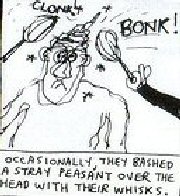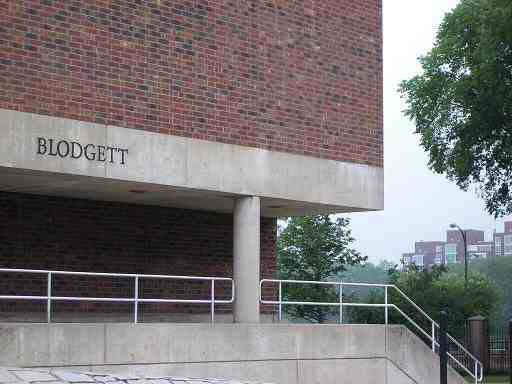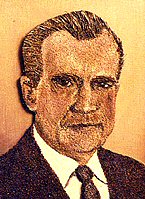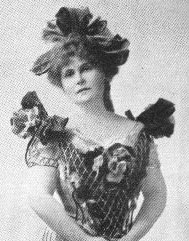Here is an exciting quiz for all the family. Below is a list of interestingly-named players taking part in the current World Cup. But - aha! - hidden among the footballers there is a fictional athlete. See if you can spot him! Clue: the fictional athlete was a protégé of the legendary trainer Old Halob, famed for his mud-bespattered raincoat, disgusting table manners, and collection of lobster thermidor recipes.
Pantsil. Jerko Lecko. Kaka. Boumsong. Jop. Shaka Hislop. Ooijer. Jan Vennegoor of Hesselink. Frings. Boulahrouz. Gilles Yapi Yapo. Fabrice Akwa. Pappoe. Nedved. Razak Pimpong. Buffon. Ching. Fred. Bosko Balaban. Ono. Song Chong-gug. Ji-hoon. Wicky. Gygax. Bobnit Tivol.
So here is Dobson, reclining in an arbour on a bright, fresh morning. The grass is dew-dappled. Dobson has an air of lassitude. In his right hand he holds a slim volume of twee verse, but he is not reading. He is gazing into the middle distance, rapt in thought. Little birds are perched on a bower above him, and they are singing sweet and mellifluous airs.
I'm sorry, that is wholly inaccurate. Let's start again. It is pouring with rain. Dobson, windswept and dejected, is trudging along the muddy towpath of the canal. He has a scowl on his face. Suddenly, he stops, and peers at something floating in the canal, something fetid and rotting and quite unidentifiable. So fascinating does Dobson find this soggy nothing that he does not notice the approach of Popsie Shadrach, the notorious floozie.
“You were absorbed in thought, Dobson,” observes the wanton, planting herself in front of him and twirling some taffeta frippery through her long fingers, the nails of which are painted crimson or scarlet or some other garish colour suitable for a floozie's manicure.
“I was indeed” replies the pamphleteer, after clearing his throat and spitting into the canal. There is a slim volume of twee verse by Dennis Beerpint poking out of the pocket of his grubby jacket, and it does not go unremarked by Popsie.
“You were thinking of her you love, I would wager” she says, and sighs. It is a startlingly impassioned sigh, but Dobson appears not to take a blind bit of notice. Instead, he begins trying to dislodge a shred of cabbage from his teeth, at first by probing with his tongue, and then by shoving a calloused finger into his gob. Dobson's nails are unpainted. In fact, they are hideously gnawed. Popsie Shadrach sighs again, languidly this time.
“You are beloved in return - yes, Dobson, most charming of out of print pamphleteers, you are indeed beloved,” she says. There is a tremulousness in her voice, a throbbing in her breast, and a fleeting shudder as Dobson finally manages to extract the shred of cabbage and inadvertently flicks it into her face. She blinks, but regains her sultriness and edges closer to the pamphleteer.
“Are you certain?” he replies, eventually, though he is still peering at the decaying matter which is bobbing in the water.
“Oh, I am but too certain. You are beloved - oh, how madly, by me!” cries Popsie, and she flings herself at his feet, caring not a jot that her gaudy red dress is now covered in muck.
“By you, Popsie Shadrach, notorious floozie that you are? You jest surely - Rise, rise, I beseech you from your unbecoming posture - unbecoming towards me” shouts Dobson, turning to look at Popsie for the first time. As he does so, a maniac crow flies past very close to his head, attracted perhaps by the beetles which crawl through his unkempt hair.
“Oh, Dobson, I love you, I adore you! Spurn me not then, I conjure you, for I cannot, cannot conquer the fatal passion with which you have inspired me” implores the notorious floozie, clutching at the hem of Dobson's filthy jacket, and pulling on it so violently that the slim volume of twee verse by Dennis Beerpint falls from his pocket into a puddle. Dobson stamps his big boot onto the ruined paperback, squelching it underfoot.
“Mistress Shadrach, you strike me with horror! It is Marigold Chew, my muse, amanuensis and typesetter, that I love” he snarls. On the other side of the canal, a lugubrious pig emerges from a clump of trees. It has roamed far from its sty, and is quite lost.
“What - and you will never love me, pamphleteer?” babbles Popsie.
“No, never while I have breath - never!” yells Dobson, slightly distracted by the appearance of the pig and wondering whether or not to report its sighting to the nearest Lost And Abandoned Pig Reporting Station. “Allow me, if possible, to respect you,” he adds, though he has no intention of doing so.
Popsie Shadrach claws at his jacket, rises to her feet, and takes a melodramatic step backwards, almost toppling into the canal. She flails her arms alarmingly, and declares in a screech, “Curses then seize thee, miscreant! I will live to blast thee for this!”
The pig disappears back into the trees, but not before Dobson has taken out his notepad and pencil and jotted down a memorandum. Popsie Shadrach awaits his response, frozen in an attitude of boiling rage.
“Most infamous of women,” says Dobson, once he is satisfied that he will be able to make an accurate report of the lost pig, adding, as he returns his pad and pencil to his inside pocket, “Let me fly from thy loathed presence - let me in the wide world seek a refuge from infamy and shame, for infamy it is to be the object of thy love!”
Batting Popsie aside, the pamphleteer trudges off along the towpath. There is a cloudburst overhead, and the rain splatters down relentlessly. Popsie scampers back to the car park and revs her souped-up jalopy, thundering off at reckless speed towards a gin joint.
We do not know whether Dobson was actually seized by her curses, nor whether she succeeded in blasting him, but it may be pertinent that when he went to the Lost And Abandoned Pig Reporting Station later that day, to report his sighting of the lugubrious pig, he found it shut.





